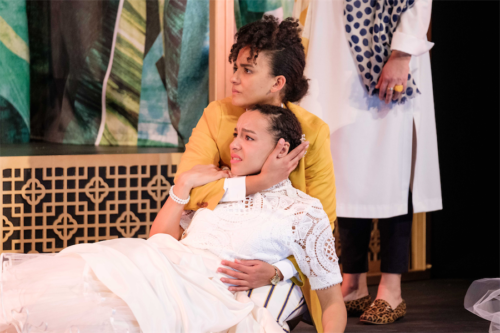
Arts editor HELEN MUSA previews next month’s staging of Bell Shakespeare’s “Much Ado about Nothing”.
SHAKESPEARE’S comedy, “Much Ado About Nothing”, it is widely acknowledged, is full of brilliant repartee, but it lingers dangerously on the brink of tragedy and it’s all the Bard can do to pull together a happy ending.
James Evans has previously staged “Julius Caesar” at The Playhouse and has played a strong part in Bell’s educational work within the juvenile justice system but all that, in contrast with this full-on “battle-of-the-sexes” comedy, was a piece of cake.
Luckily, Evans (no relation to Bell Shakespeare’s artistic director, Peter Evans) says he’s had an ally in William Shakespeare.
“Shakespeare gives you a lot of help, he smashes comic scenes right up against tragic ones and the audience is taken on a rollercoaster ride through many crazy situations,” he says.
“Comedy and tragedy sit side-by-side in Shakespeare, he’s never content with writing either one or the other… and this play features some of the most awful things ever said on the stage to a young woman.”
That young woman is Hero, the daughter of Leonato and betrothed to the young soldier-count Claudio, who is persuaded by Don John, the bastard half-brother to the Prince of Aragon, that Hero has betrayed him. He determines to expose and humiliate her on their wedding day.
“In the source material that Shakespeare used, Don John had a motive – he was in love with Hero – but in this play he deliberately makes the villain ambiguous,” Evans says.

In his view, Don John is set up as a catalyst rather than a real character to put in motion the bad behaviour of the others, so he’s more of a devious influence than a personality.
Claudio, who is so easily persuaded of Hero’s infidelity, is one of the most problematic characters in Shakespeare’s comedies and a real challenge to both director and actor.
“I’ve made a tweak, though I haven’t changed a word,” Evans says. He’d rather we didn’t tell the readers what that tweak is so they’ll enjoy it when it comes, but it’s a physical action that puts paid to the idea that Hero is a simpering pushover and, he says, “Vivienne Awosoga, as Hero, has worked hard to make her resist when she is attacked”.
And does love really conquer all? “Of course it is a comedy, signalled at the end when Benedick says: ‘Let’s have a dance ere we are married,’ but I’ve tried to imply that the ending could be about Claudio and Hero restarting a conversation.”
But misinformation, false accusations and broken promises aside, we need to remember that the two leading characters in “Much Ado,” Beatrice and Benedick, are sought after by actors all around the world – their scenes are both hilarious and familiar.
At the centre of the play is the sparring pair of loudmouths, a complete invention by Shakespeare but in the tried and true tradition of lovers who hate each other – “every second Hollywood movie has the same thing,” Evans suggests. “I’m sure Jane Austen must’ve been influenced by this play when she wrote Lizzie and Darcy.”
Beatrice is played by Zindzi Okenyo, last seen here as Cleopatra.
“I wanted the right person – she is a fierce and powerful actor, perfectly suited to this role, she’s funny but she’s malleable,” Evans says.
He looked for a perfect match with her sparring partner, Benedick, “a young man who is charming enough to get away with all the boys’ club locker room talk at the beginning” and found him in recent NIDA graduate, Duncan Ragg.
As for sheer fun, that has come without ambiguity in the achingly hilarious scenes involving Dogberry the constable and Verges, his “compartner”, to whom the plot assigns the job of snaring the villains.
“The clowns bring the house down every time,” Evans promises.
Bell Shakespeare’s “Much Ado About Nothing”, The Playhouse, October 11-19. Book at canberratheatrecentre.com.au
Who can be trusted?
In a world of spin and confusion, there’s never been a more important time to support independent journalism in Canberra.
If you trust our work online and want to enforce the power of independent voices, I invite you to make a small contribution.
Every dollar of support is invested back into our journalism to help keep citynews.com.au strong and free.
Thank you,
Ian Meikle, editor




Leave a Reply